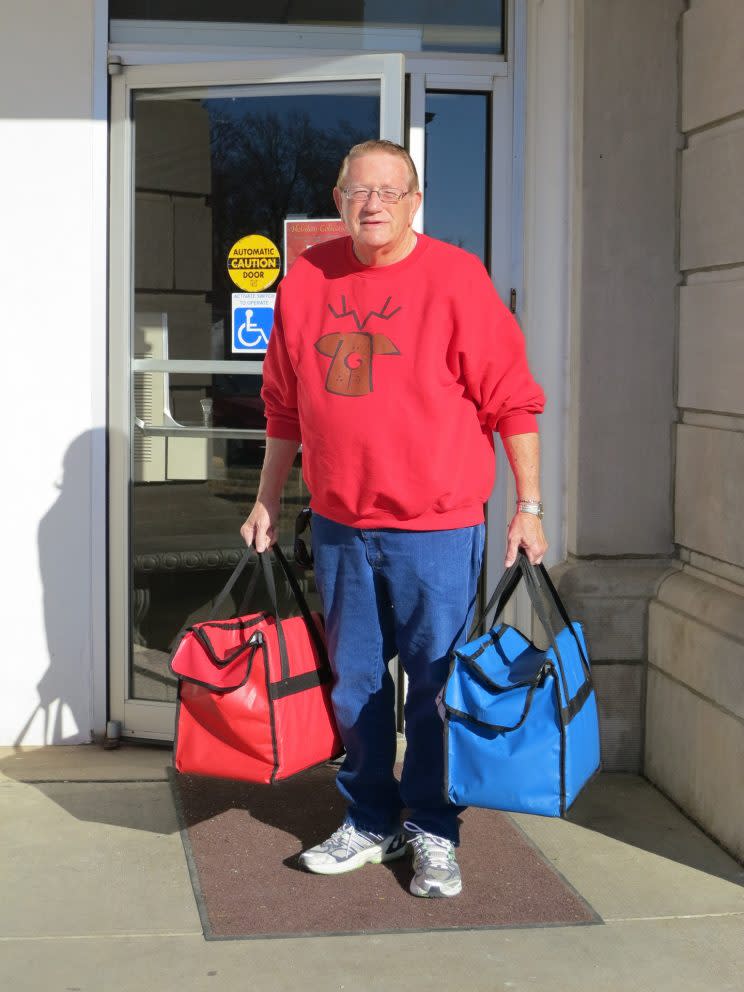Trump’s budget rattles Meals on Wheels in Kansas, where the group vows to fight on
President Trump’s recent budget proposal, which yanks federal funding for Meals on Wheels, may feel like abstract accounting to some, but for senior citizens in Saline County, Kan., it could affect what’s for dinner — and what’s not.
The Saline County Commission on Aging (COA) was founded in 1974 to look after the needs of the senior community. It runs the Salina Senior Center and Salina Meals on Wheels, which delivers food to senior citizens and people with disabilities.
Yahoo News reached out to Leslie Eikleberry, the executive director of the COA, to see how the decisions of Trump’s administration in Washington, D.C., might affect them, more than 1,200 miles to the west, in north-central Kansas.
Eikleberry said she was gutted when she heard that Trump’s budget director, Mick Mulvaney, dismissed Meals on Wheels as an unnecessary government expenditure.
“Honestly, I was devastated when I read about it and the news first started popping. It’s going to have a tremendous impact on our people,” she said.
Kansas is a solidly Republican state in presidential elections and has not voted for a Democrat since Lyndon Johnson’s 1964 landslide victory. In 2016, Trump easily won the Sunflower State with 56 percent of the vote.
The city of Salina, the administrative center of Saline County, has a population of just about 50,000. Salina Meals on Wheels provides warm, nutritious meals to between 145 and 160 people each weekday. Of those meals, roughly 130 are funded through the government.

Salina Meals on Wheels also prepares frozen meals for evenings, weekends and holidays in its kitchen and delivers these to seniors once a week if needed.
COA currently receives $9,000 to $11,000 in government subsidies per month, according to Eikleberry.
“We depend on subsidies from the government to help pay for those meals. If we don’t have that, we’re going to need to find at least another $100,000 in donations each year to help cover those meals,” she said. “I just don’t see that we’re going to find enough donations each year for that.”
A Meals on Wheels spokesperson told Yahoo News on Friday that the national organization received 50 times the average amount of donations on Thursday, shortly after Mulvaney’s criticism.
While discussing the White House’s budget — which is just a proposed blueprint, as Congress will determine its own funding priorities — Mulvaney said that although “Meals on Wheels sounds great,” the federal government should no longer give money to “programs that don’t work.” The White House budget document proposes severe cuts to nondefense discretionary spending, a relatively small part of the budget, while increasing funding for defense and homeland security programs.
“No, I don’t think so,” said Mulvaney when asked if the budget was “hard-hearted,” adding, “In fact, I think it’s one of the most compassionate things we can do. … You’re only focusing on half of the equation, you’re only focusing on recipients of the money. We’re trying to focus both on the recipients of the money and the folks who give us the money in the first place.”

Eikleberry rejected the argument that the White House budget was compassionate.
“Some of our folks have to decide between paying for their food, medication and utilities,” she said. “That’s how serious it is, so I don’t think it’s compassionate to say to them, ‘Oh, sorry. We’re going to cut your meal program. You may or may not get food because you’re using your money to pay for your utilities or your medication.’”
Despite Mulvaney’s claim, a peer-reviewed analysis of eight studies in 2013 found that six of them found “home-delivered meal programs to significantly improve diet quality, increase nutrient intakes, and reduce food insecurity and nutritional risk among participants. Other beneficial outcomes include increased socialization opportunities, improvement in dietary adherence, and higher quality of life.”
Some food recipients are in their 90s and fairly isolated, without any other relatives to help care for them. Eikleberry said their drivers develop a rapport with the senior citizens and check on them if they their routine is thrown off and they do not answer the door.
“They have nobody but us. We’re the only contact that they have with another human being,” she said. “There have been a lot of times when my drivers have found these people on the floor after a heart attack or stroke. Without us being there to see it, they could lie there for hours and possibly pass away before somebody would notice them.”
Eikleberry hopes Salina Meals on Wheels will continue delivering warm meals Monday through Friday, with an option for frozen meals on the weekends.
“We’ll find a way to do it. I hope we don’t go the way that some of the Meals on Wheels programs in the country have, where they’ve got back to only delivering meals three times a week,” Eikleberry said. “I will fight for it with everything I’ve got to make sure we can still do it.”
Read more from Yahoo News:



